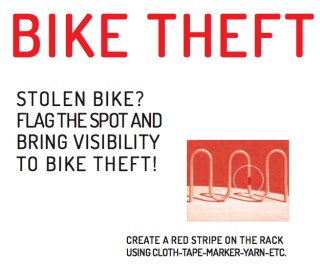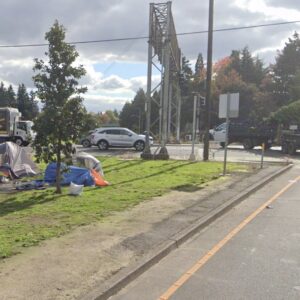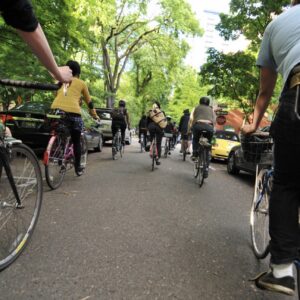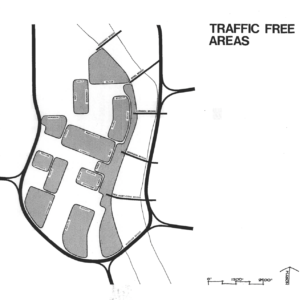
Bike theft is a major issue in Portland. So far this year we’ve had 259 bikes posted to our Stolen Bike Listings and the numbers are on the upswing. Now a pair of graduate students at Portland State University want to raise public awareness about bike theft and they’ve got a novel idea how to do it.
Erin Charpentier is a student working on her Master of Fine Arts degree in PSU’s Art and Social Practice program. “This means,” wrote Charpentier in an email today, “that my creative practice involves social engagement in some form. This can look like a lot of different things; education, activism, participatory performance, creative interventions.”
During a class meeting several months ago, Charpentier’s classmate Zach Gough got his bike stolen from the rack directly outside the Museum of Contemporary Craft in downtown Portland (NW 8th and Davis). In response, Charpentier and Gough decided to collaborate on a workshop that will “explore the craft of bike theft” and launch an “open source visual campaign to empower cyclists to make bike theft visible.”
Charpentier says the workshop, Bike Theft Storytelling and Theft Site Identification, was inspired by DIY communication models like ghost bikes and hobo symbols. As for the visual campaign, Charpentier said the idea is to call attention to the location of the theft.
“The idea is that when a bike is stolen, you mark the rack or pole with a red stripe (duct tape/fabric/marker). An accumulation of stripes would indicate a hot spot and call for caution when locking there.”
The workshop is April 30th from 5:30 – 7:30 pm at the Museum of Contemporary Craft. Learn more at the event website.





Brilliant idea!
Or even better, a sticker that says “My bike was stolen here.”
PSU & Lloyd are the hotspots.
I wouldn’t say this is wholly inaccurate, however, police reports show that Downtown has a higher rate of theft than PSU (defined as the university district, south of SW Market St). Also, PSU Campus Safety Reports show that bike thefts reported on campus have decreased by 30% from 2011 to 2012.
Great idea except when there is a particular “hot spot” other parking will be taken up and the thieves will just move to the areas where these hot spots are not. As a graduate of PSU, its safe to say all bike parking racks have had a bike stolen at one time or another. Not sure of the effectiveness of this program…
“This can look like a lot of different things; education, activism, participatory performance, creative interventions.”… Yes, a performance piece could include dressing “Militant Benny Hill Blind Ol’ Lady in Drag” waiting on camera by unsecured bikes/racks and pelting perps with an umbrella.
The “craft” of bike theft?
Oh pish posh, cynics! Yeah the art student blah blah is silly, but the idea is so simple and replicable it’s brilliant and could spread far. Yes Derek, that’s the idea: highlight where bikes get stolen, so it happens less there.
Paul,…I do not believe it was Derek’s intent to poopoo on this concept. I say his thought on the outcome is normal, and to that end would even be a reasonable observation by a Professor in class. It seems he was looking at this subjectivly. When I attended art school, we often had classroom discussions on individual project idea’s before they were executed. Personally, I love little tags, graffitti,craft items and all other minutia left around and on bike racks. I share your feelings on this idea going forward, and certainly hope that they have fun doing so.
I can see what you mean, thanks.
maybe the city can ban cable locks as a public nuisance that contributes to crime…
What about another way to look at this?
location as the focus (this approach)
vs
presence/absence of U-lock
high/low resale value of bike
locked up for short (hours) vs long time (days)
locked to something… all the way to… not locked at all
I just don’t see location as the key factor.
Just as an example, how many unassuming-looking older bikes locked with a U-lock to a bike rack are stolen in this town (as a fraction of the total)?
how about sign with MR. T face on it saying I pity the fool who steals bikes, nah really we need to get better at helping eachother with regards to high crime areas
I like that they’re thinking creatively—there’s not enough people thinking creatively about how to combat theft. But as someone who manages another university’s worth of bike racks, I’m worried about the unintended consequences. Theft is rampant. So if this idea succeeds, our bicycle parking infrastructure could get a whole lot uglier and the cost of maintenance could go up. I say “could” knowing that many city racks are scratched up and covered in stickers and tags.
However, in a space like the tram terminals or the bus mall, facilities need to meet certain design guidelines. The committees that approve these facilities may not necessarily consider bike parking a top priority and they may be less likely to approve new parking if the facilities are certain to be covered in red tape (no pun intended) and cost more to maintain.
I’d like to see an app that lets people tag online where a bike was stolen (maybe there’s one out there but nothing popular enough to cause change). Something like the Hollaback app for street harassment that, unlike police reports, allows people to understand crime in their community in real time.
If the students are set on a real world visual, what about using red ribbon? That could accomplish their goal without mucking up the racks with a lot of glue and tape that’s sure to turn a muddy brown in Portland weather.
Interesting. I’d have thought that locking them to other objects, or to themselves would correspond to higher rates of theft. But is is harder to mark those locations in ways that others will readily understand. This approach suggests that bike racks, which are intended to provide an extra measure of safety are ‘unsafe.’ Perhaps this then has more to do with the locks than with the location?
It seems like these folks have introduced a semiotic difficulty by choosing to communicate the risk of theft spatially (easier) than along one of several other axes that may be better predictors of risk.
Young people live their lives online today. Why not develop an app that ties in to police bicycle theft records?
I’m excited about how this project could actually help reduce the number of bike thefts. My concern is that in it’s current design, the program is simply calling attention to a problem, rather than empowering people to act on a solution. As described here, it will only increase the perception that one’s bike is not safe at a given location, and will not reflect any data as to how a bike was stolen from that spot. In theory, a bike could be locked up with dental floss, stolen, and red ribbon attached to the rack — and thus mistakenly convey that the site is “unsafe” despite the fact that any bike locked up there “securely” could be reasonably expected to be there when the owner returns.
By and large, what we see city wide is most bicycles stolen are not locked up at all (this is direct from the Portland Police Bureau stats). Second to that, it’s overwhelmingly likely that a cable lock was used when a locked bicycle is reported stolen. Given this, I think it would be best if this project were able to convey a slightly more sophisticated message, a la “warning; my cable lock did not prevent my bike from being stolen at this location”.
At PSU, we currently tag our bicycle racks with a decal that shows proper locking technique, strongly advises against using a cable lock, and lets riders know they can borrow a loaner-lock from the PSU Bike Hub if they forgot theirs. To further our fight against bike theft, we do not sell cable locks at the Bike Hub (you can buy a U-Lock with a cable to protect your wheels though) and we continue to push the message about the inadequacy of cable locks through our marketing and communications about bicycle commuting. Together, these efforts have helped reduce the opportunity for theft. In 2012, we saw a 30% reduction in reported bicycle thefts compared to 2011.
Where I see promise in this art project is the ability to transform the message about bicycle security into a personal one. Testimonials, especially when carried out in a creative way like this, can be very powerful in helping to create behavior change. I’m really looking forward to the workshop and seeing how this project continues to take shape!
I like the idea and sure, it is great for bringing bike theft to the top of peoples’ minds.
Social Practice… Art for the inartistic.
Wish my grad school was that easy.
This type of idea is a great one…as both deterrent (for parkers choosing racks) and hopefully for the City to take action and bring bike parking into the Silver/ Gold Level vs. the status quo (Bronze).
Though I would suggest using red tape or similarly “difficult” material to take off. As enterprising thieves if they had a favorite rack might just untie / remove scarlet marks that were not permanent.
A few years ago a group in Seattle created an app called BikeWise, http://www.bikewise.org/, which allows people to post road hazards, wrecks and stolen bicycles on a map. While the app is Seattle-centric, you can log in items for your own community. I have posted bike hazards from Sitka, Alaska, but I had to manipulate the map so it showed my area and not Seattle. When people post reports in some of the bigger cities, the report gets forwarded to the local DOT or police department.
Bike theft workshop!!! I known things are tough in this economy, but teaching people to steal bikes?!!!
Oh…, you mean anti-theft workshop. Never mind.